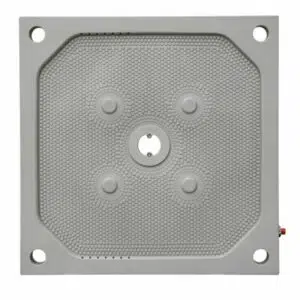For efficient solid-liquid separation, the use of the filter plate is very crucial. In the filter press system, it is the essential part that ensures good performance and long life. This article elaborates on the main points that must be inspected regularly for the filter plate, and in this way, it offers a wealth of information for the users to rely on for filtration solutions that are sure to work.

How to check regularly
Inspection of the filter plate at regular intervals is necessary to maintain its operational efficiency and to extend its life to the maximum possible extent. The users are to mind the following aspects to ensure that their filtration systems are working at the highest level of efficiency:
1. Physical Condition of the Filter Plate
Any maintenance process should start with examining the condition of the filter plate. Here’s what you should find:
Cracks and Deformations: Visually inspect the filter plate for any cracks or deformations that would expose the inner portion of the filter pad. Even a small level of damage might result in liquid leakage and a significant reduction of filtration efficiency.
Surface Wear: Do a thorough check of the surface for signs of wear or erosion, more especially in high-abrasion environments. A worn surface can limit the plate’s sealing ability and decrease overall performance.
2. Sealing Integrity
For the proper function of the filtration filter plate, it is essential that the sealing should be intact.
Compression Seals: Verify that the compression seals are well and not over-compressed, if it is too compressed it will not have any room to achieve sealing. In any case of any gaps the filtrate quality will be diminished following the leaks.
Surface Flatness: Please, evaluate the flatness of the sieve. It is often seen that uneven surfaces give customers trouble in sealing. Only the very much exceptional < 25µm flatness would do.
3. Plate Material and Corrosion Resistance
Material is an item which directly affects the filtering plate’s lifeline in case it comes in contact with harmful agents. What you should primarily do is to pay attention to:
Material Integrity: Be sure that the material you have selected (e.g., polypropylene) is appropriate for the slurry that will be filtered. Changes in material could cause the slurry to come into direct contact with the wrong material thus promoting its corrosion and degradation.
Signs of Corrosion: Inspect if corroding is taking place, taking into consideration the plates or units as the locations where this might be happening.
4. Filtration Efficiency
Maintaining efficient filtration is not only important but necessary if improved performance is to be achieved.
Filtration Speed: Complete the assessment on the filtration speed and also compare it with the speed of the expected performance. If the speed had decreased, it could mean that it’s a clogged/damaged filter plate.
Case Moisture Content: It is recommended that one looks into the moisture and the moisture content of the cake, as the cake might have the cause of error. Making the cake appear to be too wet by using moisture levels and the cake could be the reasons why a filter plate may not work well that it could need to be refreshed or stripped off from the beginning.
5. Maintenance and Cleaning
Needless to say, maintenance and cleaning are very critical for prolonging the life of the filter plates. Regularly look over that:
Cleaning Procedures: Make sure that the cleaning procedures you refer to are effective and do not impact the filter plate. Use the correct cleaning agents and methods to keep the plate in good condition.
Maintenance Records: Always record each inspection and maintenance in detail. This will help to monitor whether the filter plates are still in good condition.
Choosing the Right Filter Plate Manufacturer and Supplier
Selecting a reliable filter plate manufacturer and filter plate supplier is essential for ensuring high-quality products.
Diverse Product Range: Choose manufacturers that provide a wide variety of filter plates, including recessed chamber plates, membrane plates, and customized options to meet your specific needs.
Quality Assurance: Ensure that the supplier adheres to industry standards, such as the China JB/T4333.3-2005 and Germany DIN7129 standards. This guarantees that the filter plates meet the required specifications for performance and durability.
Expert Support: Opt for suppliers that offer expert guidance and support in selecting the right filter plates for your filtration processes.
Conclusion
Regular inspections of the filter plate are vital for maintaining optimal performance in filtration systems. By focusing on the physical condition, sealing integrity, material integrity, filtration efficiency, and proper maintenance, users can ensure that their filter plates operate effectively.
Choosing a reputable filter plate manufacturer and filter plate supplier like Jing Jin guarantees access to high-quality products designed for durability and performance. Contact us today to learn more about our diverse range of filter plates!

